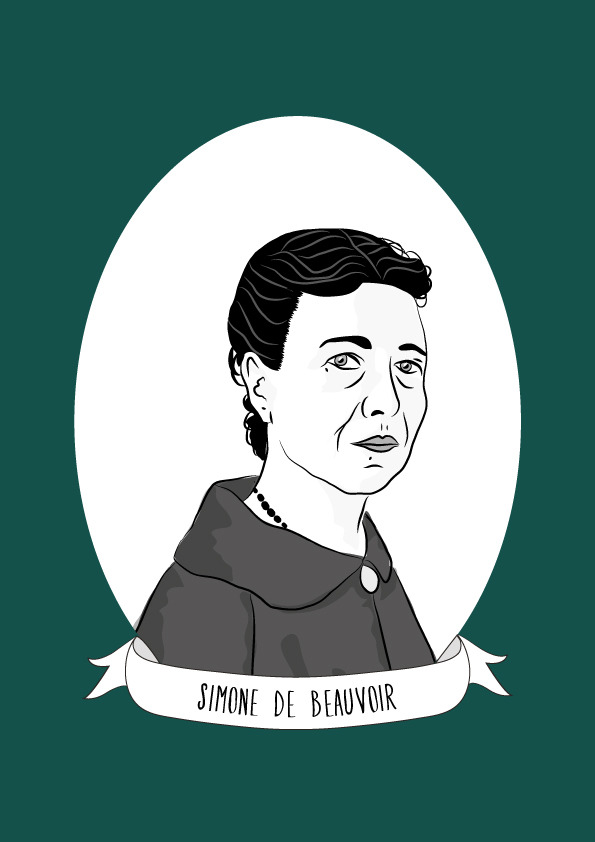Simone de Beauvoir was a French existentialist philosopher and writer. She laid the foundation for the modern feminist movement.
De Beauvoir was born into a family that had lost most of their fortune shortly after World War 1. She attended a prestigious convent school and was religious to the point that she intended to become a nun until at 14, she became an atheist. She would later say that religion was only a method of avoiding truth. As de Beauvoir’s family were not wealthy, she did not have a dowry to enhance her opportunity for marriage. She took this as a positive, using her ability to ’think like a man’ – according to her father – to become independent. She studied mathematics at the Institut Catholique and literature/languages at the Institut Sainte-Marie before going on to graduate with a degree in Philosophy from the Sorbonne, becoming the 9th woman at the time to have received a degree from the institution as French women had only recently been allowed to join higher education.
In 1929 de Beauvoir met Jean-Paul Sartre and the two of them took first (Sartre) and second (de Beauvoir) place in the highly competitive philosophy agrégation exam. De Beauvoir was the youngest student ever to pass the agrégation in philosophy and became the youngest philosophy teacher in France. De Beauvoir and Sartre began a life-long partnership and untraditional romantic relationship. Both would date other people, and de Beauvoir dated both men and women.
De Beauvoir taught at a number of Lycées in Marseille, Rouen and Paris from 1931 – 1941 when she was dismissed from her teaching post by the Nazi government following the Nazi occupation of Paris in 1940. She then became a professor at the Sorbonne for three years before a parental complain about corrupting a female student led to her dismissal. She never returned to teaching. In 1943 her fictionalized account of a relationship between her, Sartre and her student(s) entitled L’Invitée (She Came to Stay) was published. It gained her public recognition.
In 1949 her book Le Deuxième Sexe (The Second Sex) was published, it analysed reasons why women’s role in society was characterized as inferior to men and was highly controversial. Critics stated that the book was pornography and the Vatican placed it on the Index of Forbidden Books. Le Deuxième Sexe was published in America in 1953, but it wasn’t until 2009 when an unedited English volume was published that the version really did her writing justice. The publication greatly increased de Beauvoir’s reputation as a feminist, although it wasn’t until 1972 that she was comfortable calling herself one.
De Beauviour published a range of fiction and non-fiction works, the best known is Les Mandarins (The Mandarins, 1954) which urged people to participate in political activism. The work won her France’s highest literary prize, the Prix Goncourt. After World War II De Beauvoir became critical of Capitalism, she took a five-month trip in the United States which reinforced her belief in Communism and wrote L’Amérique au jour de jour (America Day by Day), critically evaluating the social problems, class inequalities and racism she witnessed during her visit to the United States. In 1945 she helped found the politically non-affiliated, leftist journal, Les Temps Modernes, which she both edited and contributed articles for including “Moral Idealism and Political Realism,” “Existentialism and Popular Wisdom,” and “Eye for an Eye.”
In 1970, Beauvoir helped to launch the French Women’s Liberation Movement in signing the Manifesto of the 343 for abortion rights and in 1973, she instituted a feminist section in Les Temps Modernes. She also participated in demonstrations and continued to write and lecture on the situation of women.
In her later career, de Beauvoir continued to write fiction, philosophical essays and interviews. Her autobiography was published in four volumes titled Mémoires d’une jeune fille rangée (Memoirs of a Dutiful Daughter, 1958), La Force de l’âge (The Prime of Life, 1960), La Force des choses (Force of Circumstance, 1963), and Tout compte fait (All Said and Done, 1972). In 1970 she published a study of the oppression of older members of society, La Vieillesse (The Coming of Age). She takes a similar approach as The Second Sex, only focusing on a different subject. In 1981 she wrote La Cérémonie des Adieux (Adieux: A Farewell to Sartre) detailing the last years of her partner’s life. De Beauviour died six years after Sartre and they share a grave in Paris.
